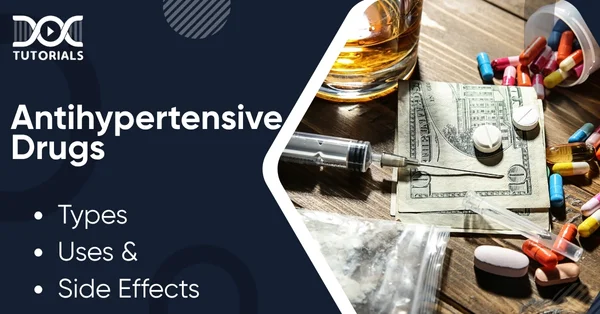Antihypertensive Drugs: Types, Uses, and Side Effects

Antihypertensives, or blood pressure medications, help lower blood pressure. Some help relax the blood vessels, making it easier for blood to flow. Others block certain hormones that raise blood pressure or help the body eliminate excess fluid.
Healthcare providers consider several factors when prescribing medication, including age, sex, overall health, and blood pressure. They may also combine different types of medications to better control blood pressure and reduce side effects.
If you are an aspiring medical student preparing for the NEET PG exam or a healthcare provider, you must know anti-hypertensive drugs, their uses, types, and side effects. Keep reading for detailed insight.
What are Antihypertensive Drugs?
Antihypertensive drugs are medications used to lower high blood pressure (also known as hypertension). These drugs help reduce the force of blood pushing against the walls of the arteries, which lowers the risk of heart attacks, strokes, kidney damage, and other serious health problems. Taking them as a doctor directs can help people stay healthy and avoid long-term blood pressure complications.
What is the Antihypertensive Drugs Classification?
Antihypertensive drugs are divided into several types, each working differently to lower blood pressure. They help manage hypertension by targeting specific body functions like heart rate or fluid balance. Understanding these antihypertensive drug classifications helps medical students and healthcare providers choose the proper treatment.
The classification of antihypertensive drugs with examples is as follows:
1. Diuretics
Diuretics, commonly called water pills, help the body eliminate excess water and salt and regulate blood pressure. Thus, diuretics come in various forms and are frequently combined with other drugs.
Commonly prescribed diuretics include furosemide (Lasix), bumetanide (Bumex), torsemide (Demadex), and amiloride (Midamor, Hydro-ride).
2. Beta-Blockers
Beta-blockers lower blood pressure by slowing the heart rate and helping blood vessels relax. Some of them are Atenolol (Tenormin), bisoprolol (Zebeta), Carvedilol (Coreg), and Carvedilol phosphate (Coreg CR).
3. ACE Inhibitors
Angiotensin is a chemical that makes the arteries narrow. ACE (Angiotensin-Converting Enzyme) inhibitors reduce the amount of angiotensin the body makes and help blood vessels relax, lowering blood pressure.
Captopril (Capoten), Enalapril (Vasotec), Fosinopril (Monopril), and others are commonly prescribed ACE inhibitors.
4. Angiotensin II Receptor Blockers (ARBs)
These drugs prevent the effects of the chemical angiotensin, which narrows the arteries. This means blood vessels stay open and lower blood pressure. Some of them are Candesartan (Atacand), Losartan (Cozaar), valsartan (Diovan), and irbesartan (Avapro).
5. Calcium Channel Blockers
This drug prevents calcium from entering the arteries and cardiac muscle cells. Calcium channel blockers reduce blood pressure by relaxing and widening narrow blood vessels.
Some of them are amlodipine (Norvasc), Diltiazem (Cardizem CD, Felodipine (Plendil), Nicardipine (Cardene SR), and more.
6. Alpha Blockers
These medications reduce the resistance of the arteries and relax the muscle of the vascular walls. Some of the alpha blockers prescribed are Doxazosin (Cardura), Prazosin (Minipress), and Terazosin hydrochloride (Hytrin).
7. Blood Vessel Dilators (Vasodilators)
Blood vessel dilators relax the muscles in the vessel walls, causing the vessels to widen and allowing blood to flow more easily. Commonly prescribed blood vessel dilators include Hydralazine (Apresoline), Minoxidil (Loniten) and more.
Thus, each classification of antihypertensive drugs works differently and is more suitable for certain individuals depending on their health conditions, age, and other treatments. Therefore, it is important to take these medications exactly as the healthcare provider prescribes and attend regular follow-up appointments.
What are the Side Effects of Antihypertensive Drugs?
Depending on the substance and individual, side effects to these medications will differ. Some of the side effects of antihypertensives are as follows:
- Headaches
- Fatigue
- Weakness
- Cough (common with ACE inhibition drugs)
- Oedema (fluid retention)
- Diarrhea
- Constipation
- Nausea and vomiting
- Weight loss
- Hives
- Skin Rash
- Trouble breathing after taking an antihypertensive
Before starting any antihypertensive treatment, patients should discuss all medications they are taking with their healthcare provider to avoid side effects and ensure the treatment is safe and effective.
FAQs About Antihypertensive Drugs
- What is the clinical use of antihypertensive drugs?
Many patients who take blood pressure drugs are able to reduce their elevated blood pressure and prevent their hearts from exhausting. They also help prevent heart attacks, strokes, kidney failure, and heart failure.
- What are the most popular antihypertensive drugs?
The most popular antihypertensive drug is the ACE inhibitor lisinopril (Prinivil, Zestril), a calcium channel blocker.
- Can antihypertensive drugs be taken during pregnancy?
No, not all antihypertensive drugs are safe during pregnancy. Certain medications, such as ARBs (Angiotensin Receptor Blockers) and ACE inhibitors, are prohibited. Safer alternatives like methyldopa or labetalol are used under medical guidance.
- Are there any side effects of antihypertensive drugs?
Typical side effects may include dizziness, fatigue, headaches, cough, frequent urination, or swelling.
- What should I do if I miss a dose of my antihypertensive medication?
It is advised to take the missed dose as soon as possible and not double up. Follow the doctor’s instructions and maintain a routine to avoid missing doses.
Conclusion
Antihypertensive drugs play an important role in managing high blood pressure and preventing serious complications like heart attacks, strokes, and kidney damage. Understanding their types, uses, and side effects is essential for safe treatment.
Regular checkups and lifestyle changes are crucial for managing high blood pressure, leading to a healthier and longer life.
If you are a NEET PG student, DocTutorials offers several resources, including in-depth video lectures, test series, expert guidance, and more.
Explore DocTutorials’ courses to excel in your NEET PG exam and medical career!
Latest Blogs
-

NEET PG Exam 2025- Date, Pattern, Marking Scheme, Subject Wise Weightage, and Exam Mode
NEET PG Exam 2025 is the ultimate gateway for medical graduates aspiring to pursue postgraduate courses in medicine, including MD,…
-

INI CET Exam 2025: Your Roadmap to Success – Key Topics, Strategies, and Lessons from Last Year’s Papers
The INI CET exam is more than just a test; it’s a significant milestone for many medical students aiming to…
-

INI CET Exam Success: Previous Year Question Papers & Ultimate Guide – INI CET PYQ
One can feel overwhelmed while preparing for the INI CET (Institute of National Importance Combined Entrance Test). A vast syllabus,…




